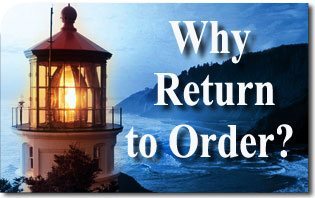Interview with John Horvat II,
Author of Return to Order
John Horvat II is a scholar, researcher, educator, international speaker, author and regular contributor to Crusade Magazine. His writings have appeared worldwide in numerous publications and websites.
For more than two decades, he has been researching and writing about the socio-economic crisis inside the United States that has culminated in the ground-breaking release of his new book Return to Order: From a Frenzied Economy to an Organic Christian Order—Where We’ve Been, How We Got Here, and Where We Need to Go. Recognized as one of the most important books on the subject to be published in the past ten years, Mr. Horvat describes what went wrong in our economic model and what can now be done to put us back on course. He lives in Spring Grove, Pennsylvania where he heads the Tradition, Family, and Property Commission on American Studies.
Mr. Horvat talks about his book in an interview with Crusade Magazine.
Crusade: What is new about Return to Order’s solution?
Mr. John Horvat: Most people, when they think of solutions, they think of systems. They think, “What system can I put in place that will resolve all the problems?” They try to find a one-size-fits-all solution and then impose it upon society.
Our solutions are different in that we want what we call an organic Christian society. Organic solutions take a framework of very basic principles from which solutions can naturally develop and adapt to situations and human qualities.
It is not a rigid system or socialist program that imposes a whole set of rules and regulations upon society. It is not a one-size-fits-all solution.
 Learn All About the Prophecies of Our Lady of Good Success About Our Times
Learn All About the Prophecies of Our Lady of Good Success About Our Times
What we propose is having recourse to those timeless Christian principles that are wonderfully in accordance with man’s nature and result in a world of applications. These principles are extremely stable since they are guided by natural law which is the same for all peoples and all times. However, they also can give origin to a refreshingly rich and diverse culture and a vibrant economy.
This is what is new (and old) about our solutions. We do not favor those one-size-fits-all systems that never really resolve problems. We favor those adaptive solutions that favor virtue and consider the human side of things.
Crusade: Could you give an example of an organic Christian society?
Mr. John Horvat: An example of how things in an organic Christian society work brings to mind the family. You can’t simply invent a brand new kind of family and then impose it upon a people by saying a family must be exactly this way or that.
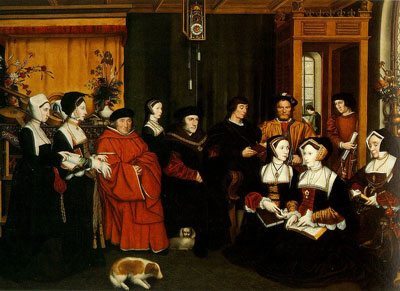
No. A true idea of the family is established when in accordance with a few general principles based on natural law and the nature of the family.
Using these notions as a foundation, you leave it up to the family to adapt and to develop its own way of being, its own way of operating and its own way of living. From this comes an authentic culture where society develops a very rich life full of spontaneity, vitality and beauty.
How Do We Build an Organic Society?
This is an organic solution. It’s not a mechanical solution or a rigid system that imposes itself upon people and stifles culture. It does not let government get involved in areas where it should not be involved. Best of all, this organic Christian society is the foundation and properly speaking the heart and soul of a balanced economy that we so need.
Crusade: What’s wrong with our current economy?
Mr. John Horvat: We have an economy that is constantly working itself into a frenzy—what we call frenetic intemperance.
Frenetic intemperance is a term coined to describe a restless and reckless spirit inside certain sectors of modern economy that fabricates a drive to throw off all legitimate restraints and to gratify disordered passions.
Frenetic intemperance is not just greed and ambition, but an explosive expansion of human desires beyond traditional and moral bounds. It leads to economic activities where people resent the very idea of restraint and scorn the spiritual, religious, moral and cultural values that normally serve to order and temper economic activity. It creates an almost irrational element that enters into the economy and leads to frantic dealings, speculation and exaggerated risks.
You can’t solve this economic problem by legislation, regulation and planning. It’s a problem deep inside the soul of modern man. The only real response to frenetic intemperance is a corresponding return to temperance.
Can There Be Banking Without Frenetic Intemperance? — The Bank That Trust Built
Crusade: What is an example of frenetic intemperance?
Mr. John Horvat: You need only look back to the 2008 subprime mortgage crisis. It’s a textbook example of frenetic intemperance. Here you have a case of home buyers who took out loans without the means to pay for them. You have bankers who extended loans to people knowing that many of these were risky. You have brokers who took all these bad mortgages and put them into securities. Then investors came and snatched up these securities, many of them knowing that these mortgages were not the best mortgages. Everyone threw caution to the wind and as a result the whole system almost came down.
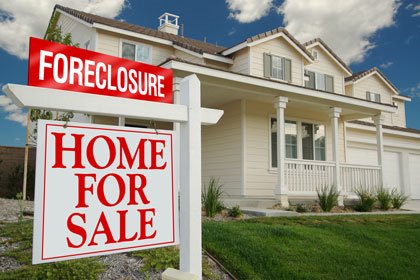
Photo Credit: © Andy Dean – stock.adobe.com
One of the aspects of frenetic intemperance is that it is a reckless drive to throw off restraints and to gratify desires. These restraints normally temper economy and make it human by keeping it within bounds.
With this frenetic intemperance, we see the quickening of the pace of life, the erasing of the human element from economy so that we’re always talking to machines and keeping up a machine-like pace in life. People have been reduced to cogs, so to speak, in a giant economy.
Which Model Will Work for Running America?
Frenetic intemperance takes the warmth of human interactions out of economy. It makes life brutal by taking out the moral aspects. It is part of the reason why communities have broken down. When people communicate more on their cell phones and not face-to-face, you don’t have those relationships you had once before. It takes away what economists call “social capital.” That is to say, we are losing the idea of community where people are linked together with the bonds of confidence and trust that allow an economy to work in a very smooth and human way.
Crusade: What is the “rule of money”?
Mr. John Horvat: When frenetic intemperance dominates, money tends to rule. Men put aside cultural and moral values and adopt a different set of values that attaches undue importance to quantity over quality, utility over beauty, and matter over spirit.
The tragic effect of all this is that modern economy has become cold and impersonal, fast and frantic, mechanical and inflexible.
We need to put the human element back into the economy and society in general. We need a return to order—a Christian order.
Crusade: What is the best response to the “rule of money”?
Mr. John Horvat: The best response to the rule of money is what we call a “rule of honor.”

Honor conveys the idea of values that cannot be bought and sold. It supposes an appreciation of things that have quality. It spreads an atmosphere of tranquility and temperance over the marketplace.
The rule of honor naturally leads men to esteem and seek after those things that are excellent. It introduces into the marketplace a set of values that includes quality, beauty, goodness, and charity. We find the calming influence of the cardinal virtues.
The greatest product of the rule of honor is not capital but character.
Someone might ask, “How do you implement a rule of honor?” I would say fill society with principles, ideas, and moral values and the influence of the rule of money will greatly diminish. One of the goals of the book is to introduce these ideas into society and the marketplace.
Crusade: How do we resolve our current economic problems?
Mr. John Horvat: First, we don’t need reams of government legislation. This is something much more profound. We need to refocus our priorities, reorder our lives and practice temperance and the cardinal virtues.
We need a return to organic Christian society. Such a society is termed “organic” because this order does not treat people like parts of a machine, but like the living human beings that we are.
By organic society, we mean a society that reconnects with the human element that has been lost in modern society. It allows the natural restraining influence of customs, morals, family or community to rebuild social networks, calm markets and prevent frenetic intemperance.
Toward Virtuous Leadership: Fixing the Military’s Moral Compass
By a Christian society, we mean a society anchored in virtue, especially the cardinal virtues. It is a society guided by natural law and a social order that takes our fallen nature into consideration. It is oriented toward the common good and facilitates virtuous life together in community. It is a society full of nuance and meaning, poetry and passion.
Crusade: How does one implement this return to order?
Mr. John Horvat: Organic solutions cannot be forced upon a people. They must be developed naturally.
In our book, we show how the present socio-economic model is collapsing. And when this happens, we will need to adopt a model that will bring us through the crisis.
That is to say by force of circumstance, we will be looking for models to implement. We will need to avoid socialist and liberal models that will be proposed.
There’s nothing better than to return to the roots of our Christian order that are already part of our heritage and tradition. It’s tried and true. This book puts this option on the table and shows how we can already start moving in this direction.
The “Strong Money” of Good King Saint Louis
Crusade: What makes these principles “tried and true”?
Mr. John Horvat: The testimony of history comes to the defense of these principles. Their track records are excellent. People tend to think that civilization before the Industrial Revolution was primitive and backwards. This is far from the case—Christian civilization actually prepared the way for true progress.
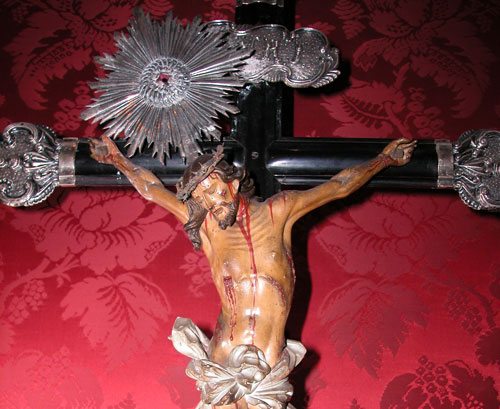
The principles that gave rise to Christendom helped usher in a period of incredible dynamism and enormous technological advances.
Historian Samuel Lilley reports that the technological changes of the Middle Ages were greater in scale—by a very large factor—and more radical in kind than any since the start of civilization.
This was a society that didn’t make an enemy of technology. Men in medieval times introduced machinery into Europe on a scale no civilization had previously known. Some historians claim that the Industrial Revolution was actually an extension of processes that began in the Middle Ages. Historian Lynn White states that Christendom was the first complex civilization in history that was not built on the backs of slaves. This dynamic progress was not something limited to technology but also extended to advances in law, education, medicine, economics and government.
If you don’t trust the history books, then at least visit the monuments, cathedrals, universities, and castles that still stand in Europe. They give some idea of what was accomplished.
Crusade: What can the average American do?
Mr. John Horvat: We are part of the culture of frenetic intemperance. And so in Return to Order, we discuss how in our personal lives, we can all find ways to disengage ourselves from the frenzied, fast-paced lifestyles that we have created for ourselves.
What is Christian Civilization?
We can reject what we call the rule of money and the mass markets that feed frenetic intemperance. In our personal lives, we can reconnect with that missing human element of society and economy. Any measure that strengthens the family, community and parish is a positive measure we can take to return to order. Any measure that increases our appreciation for reflection, beauty, duty and virtue is a positive measure by which we can return to what we call the rule of honor.
Much more important, we need to understand the crisis and engage in the debate over the future of our nation. Return to Order invites everyone to join the debate over these issues which we believe will be gaining ever great importance as the present crisis deepens.
Crusade: Why is a return to order necessary now?
Mr. John Horvat: One of the most compelling reasons why Return to Order is necessary is because the present American model, which sustained us over generations, is now unraveling. Our American way of life is not what it used to be. Our industrial production is diminishing. We have difficulty getting along with others in society. The polarization of the country is pushing people into irreconcilable camps. These developments make a return to order essential.
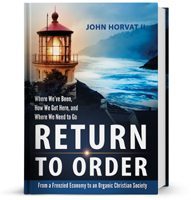
Click Here.
People already need to have in mind that certain options are available. You already have some options being proposed by people on the right and on the left that are vague and simplistic.
When the time of reckoning comes, when the time of crisis comes, I fear that people will simply take the first thing that’s presented out there. And sometimes those things are socialist plans or rehashed notions of past errors.
What Do We Mean by an Organic Christian Society?
We must already have something in mind. A return to order is what is needed. It isn’t a socialist five-year plan. It isn’t something vague or theoretical. We are proposing ideas and principles that have served us well in the past. These same timeless principles can be applied to the new circumstances and result in refreshing and novel solutions that are so much needed.
Of course, a return to order does not make sense without a return to God, the Blessed Mother and the Church. The message of Fatima is essentially a warning, calling upon us to either return to order or face the consequences. An orderly society is a virtuous society that confides in Providence and leads us to love God. Such a society is possible and it is to this society that we must return.

